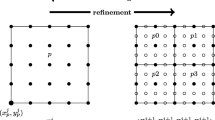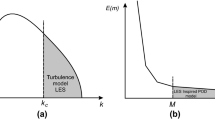Abstract
This article presents a reduced-order adaptive controller design for fluid flows. Frequently, reduced-order models are derived from low-order bases computed by applying proper orthogonal decomposition (POD) on an a priori ensemble of data of the Navier–Stokes model. This reduced-order model is then used to derive a reduced-order controller. The approach discussed here differ from these approaches. It uses an adaptive procedure that improves the reduced-order model by successively updating the ensemble of data. The idea is to begin with an ensemble to form a reduced-order control problem. The resulting control is then applied back to the Navier–Stokes model to generate a new ensemble. This new ensemble then replaces the previous ensemble to derive a new reduced-order model. This iteration is repeated until convergence is achieved. The adaptive reduced-order controllers effectiveness in flow control applications is shown on a recirculation control problem in channel flow using blowing (actuation) on the boundary. Optimal placement for actuators is explored. Numerical implementations and results are provided illustrating the various issues discussed.
Similar content being viewed by others
REFERENCES
Armaly, B. F., Durst, F., and Pereira, J. C. F. (1983). Experimental and theoretical investigation of backward-facing step flow. J. Fluid Mech. 127, 473–496.
Bangia, A. K., Batcho, P. F., Kevrekidis, I. G., and Karniadakis, G. E. (1997). Unsteady two-dimensional flows in complex geometries: comparative bifurcation studies with global eigenfunction expansions. SIAM J. Sci. Comput. 18, 775–805.
Barbu, V., and Sritharan, S. S. (1998). H∞-control theory of fluid dynamics. Roy. Soc. London Proc., Series A Math. Phys. Eng. Sci. 454, No. 1979, 3009–3033.
Berkooz, G., Holmes, P., and Lumley, J. L. (1993). The proper orthogonal decomposition in the analysis of turbulent flows. Ann. Revi. Fluid Mech. 25(5), 539–575.
Bristeau, M. O., Glowinski, R., and Periaux, J. (1987). Numerical methods for the Navier-Stokes equations: Applicationa to the simulation of compressible and incompressible viscous flows, Reports UH-MD-4, University of Houston. In Comput. Phys. Rep.
Chambers, D. H., Adrian, R. J., Moin, P., Stewart, D. S., and Sung, H. J. (1988). Karhunen-Loeve expansion of Burgers' model of tubulence. Phys. Fluids 31, 2573–2582.
Fursikov, A., Gunzburger, M. D., and Hou, L. S. (1998). Boundary value problems and optimal boundary control for the Navier-Stokes system: The two-dimensional case. SIAM J. Control Optim. 36, No. 3, 852–894.
Gunzburger, M. D. (1989). Finite Element Methods for Viscous Incompressible Flows, Academic Press, London.
Gunzburger, M. D., ed. (1995). Flow Control, IMA 68, Springer Verlag.
Hou, L. S., and Ravindran, S. S. (1997). A penalized Neumann control approach for solving an optimal Dirichlet control problem for the Navier-Stokes equations. SIAM J. Control Optim. 36(5), 1795–1814.
Hou, L. S., and Ravindran, S. S. (1999). Numerical approximation of optimal flow control problems by a penalty method: error estimates and numerical results. SIAM J. Sci. Comput. 20, No. 5, 1753–1777.
Ito, K., and Ravindran, S. S. (1998). A reduced-order method for simulation and control of fluid flows. J. Comput. Phys. 143, 403–425.
Joslin, R. D., Gunzburger, M. D., Nicolaides, R., Erlebacher, G., and Hussaini, M. Y.(1997). A self-contained, automated methodology for optimal flow control validated for transition delay. AIAA J. 35, 816–824.
Kirby, M., Boris, J. P., and Sirovich, L. (1990). A proper orthogonal decomposition of a simulated supersonic shear layer. Int. J. Numer. Methods Fluids 10, 411–428.
Kim, J., and Moin, P. (1985). Application of a fractional-step method to incompressible Navier-Stokes equations. J. Comput. Phys. 59, 308–323.
Kloucek, P., and Rys, F. S. (1994). On the stability of the fractional-step θ-scheme for the Navier-Stokes equations. SIAM J. Numer. Anal. 31, 1312–1335.
Muller, S., Prohl, A., Rannacher, R., and Turek, S. (1994). Implicit time-discretization of the non-stationary incompressible Navier-Stokes equations, Proc. 10th GAMM-Seminar, Kiel, Jan. 14–16, 1994 (G. Wittum, Hackbusch, eds), Vieweg.
Rajaee, M., Karlson, S. K. F., and Sirovich, L. (1994). Low dimensional description of free shear flow coherent structures and their dynamical behavior. J. Fluid Mechan. 258, 1401–1402.
Ravindran, S. S. (2000). A reduced order approach to optimal control of fluids using proper orthogonal decomposition. Int. J. Numer. Methods Fluids 34(5), 425–448.
Sani, R. L., and Gresho, P. M. (1994). Resume and remarks on the open boundary condi tion mini-symposium. In International Journal of Numerical Methods in Fluids, Vol. 18, pp. 983–1008.
Sirovich, L. (1987). Turbulence and the dynamics of coherent structures: Part I-III. Quart. Appl. Math. 45(3), 561–590.
Sirovich, L. (1991). Analysis of turbulent flows by means of the empirical eigenfunctions. Fluid Dyn. Res. 8, 85–100.
Sritharan, S. S., ed. (1998). Optimal Control of Viscous Flows, SIAM, Philadelphia.
Temam, R. (1984). Navier-Stokes Equations: Theory and Numerical Analysis, 3rd rev. edition, North-Holland, Amsterdam.
Author information
Authors and Affiliations
Rights and permissions
About this article
Cite this article
Ravindran, S.S. Reduced-Order Adaptive Controllers for Fluid Flows Using POD. Journal of Scientific Computing 15, 457–478 (2000). https://doi.org/10.1023/A:1011184714898
Issue Date:
DOI: https://doi.org/10.1023/A:1011184714898




